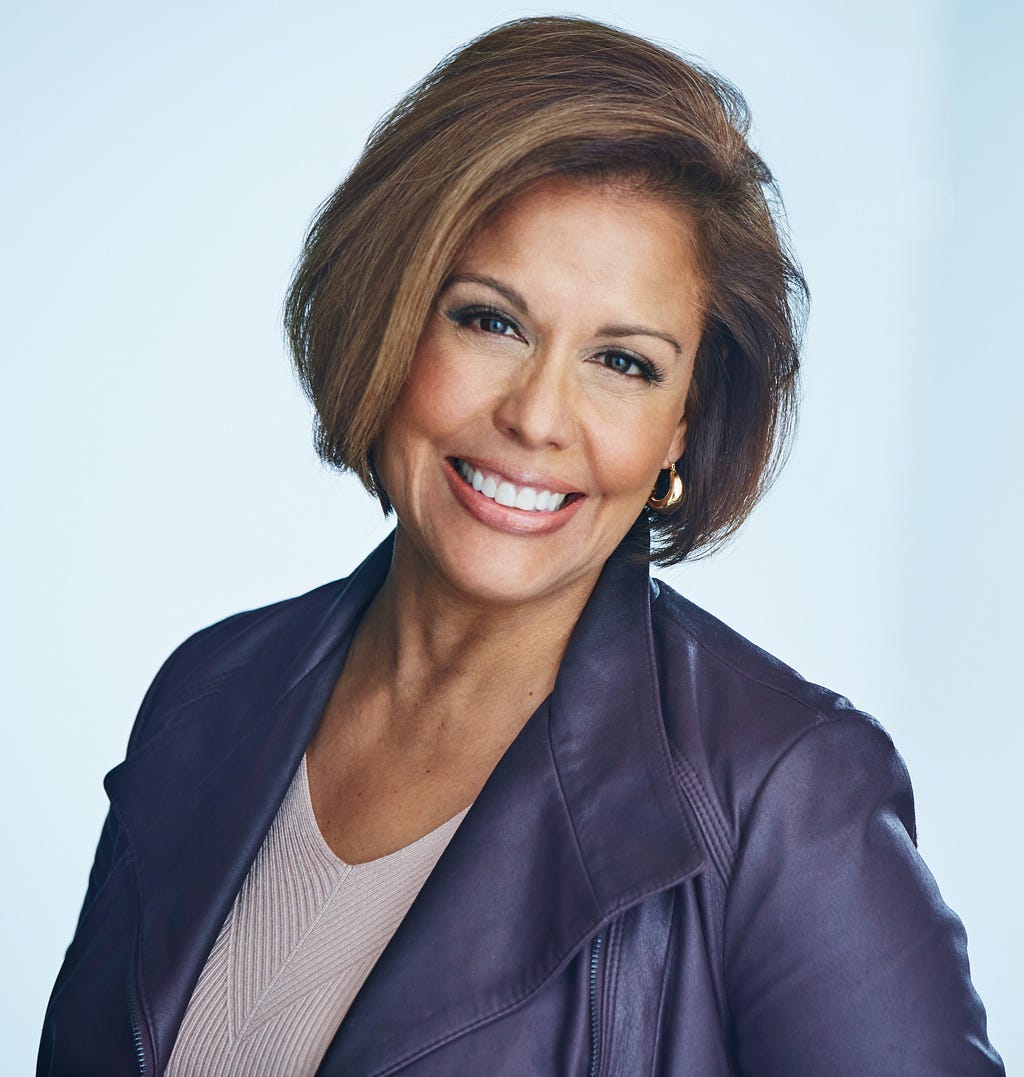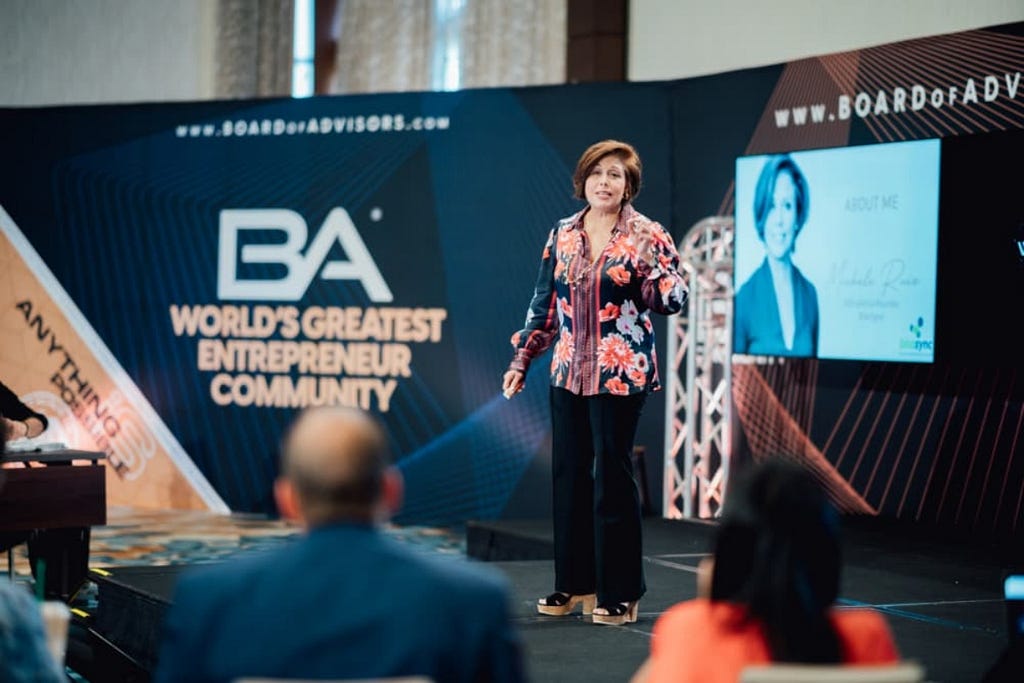Michele Ruiz of BiasSync On 5 Steps We Must Take To Truly Create An Inclusive, Representative, and Equitable Society

Varying experiences and backgrounds statistically create better, more profitable companies. Further, workplaces now have five generations in the workplace. There is great expectation that companies will prioritize DEI and will make decisions about joining a company based on whether or not the employer truly values these principles.
As part of our series about ‘5 Steps We Must Take To Truly Create An Inclusive, Representative, and Equitable Society’ I had the pleasure to interview Michele Ruiz of BiasSync.
Michele leads the development and implementation of the business and overall growth strategy for BiasSync. An entrepreneur, keynote speaker, and bestselling author, she is passionate about communication, diversity and inclusion. Michele has founded several businesses, including her last company, communications firm Ruiz Strategies. The company’s clients include Fortune 20 corporations in the energy, technology, telecommunications, financial and automotive sectors, along with several federal and state government agencies. Before becoming an entrepreneur, Michele Ruiz enjoyed a long career as an award-winning television broadcast journalist in Los Angeles.
Thank you so much for doing this with us! Before we dig in, our readers would like to ‘get to know you’. Can you tell us a bit about how you grew up?
I had very challenging circumstances when I grew up. I was raised by a single parent who didn’t have a college education herself. Unfortunately, we had a very financially unstable situation, often being evicted, going without food at times, lights being turned off, and all this financial struggles and uncertainty. My babysitting money when I was 13 was used to feed myself, and my sister.
There were some other traumatic experiences. I experienced child abuse — physical and emotional. I used those experiences in my childhood to become very self-reliant in my early adulthood.
Is there a particular book that made a significant impact on you? Can you share a story or explain why it resonated with you so much?
There have been several. One is Man’s Search for Meaning. Here is a victim experiencing the most depraved and barbaric circumstances and found that one’s attitude can’t be taken from someone even when faced with unavoidable suffering. The book resonated given the suffering I experienced as a child, and most importantly got me thinking about how to use my experiences to survive and thrive.
Do you have a favorite “Life Lesson Quote”? Do you have a story about how that was relevant in your life or your work?
“When you were born, you were crying and everyone around you was smiling. Live your life so that at the end you’re the one smiling and everyone around you is crying.” ~ Unknown
This is relevant as I became purpose driven after the life changing experience of losing one of my sons. I could have stayed in a state of grief and anger or alternatively to use my life experiences to impact others in a positive way.
How do you define “Leadership”? Can you explain what you mean or give an example?
Leadership is helping people succeed and inspiring them to unite behind a common purpose to positively impact the world.
Our purpose is to create more fair and respectful workplaces. We’re fortunate that we have a very committed team in developing ground breaking tools to mitigate implicit bias. And we launched shortly before the pandemic started, and like many businesses needed to make cuts to make it through. All stayed committed trusting us as leaders (myself and my co-founder) and committed to the impact we were having.
Ok, thank you for all that. Now let’s move to the main focus of our interview. In the summer of 2020, the United States faced a very important self-reckoning about race, diversity, equality and inclusion. This is, of course, a huge topic. But briefly, can you share your view on what made the events of 2020 different from racial reckonings in the past?
The monumental impact of George Floyd’s murder created an inflection point in our collective senses about the callous cruelty experienced by many Black Americans. The combination of his murderer’s indifference to his anguish and his suffering, which happened to be captured on video, shocked many of us to the core. The world changed, including in workplaces. Racism, racial bias, and systemic inequity was in our face and undeniable.
Can you tell our readers a bit about your experience working with initiatives to promote Diversity and Inclusion? Can you share a story with us?
For my company, BiasSync, I was challenged to come up with a solution to be a disruptor in the marketplace. What happened was one of my co-founders (who has been a business mentor of mine for many years) called me up one day. He said, “I’ve been looking to purchase some kind of diversity and inclusion training and everything I see online is terrible. You know some stuff about this. Go out and let’s figure out a disruptor to this space and bring something better to the marketplace. Using my skills as a former journalist, I talked to a variety of experts focused on how to change behavior. And that is how we came up with BiasSync and our behavior change methodology.
This may be obvious to you, but it will be helpful to spell this out. Can you articulate to our readers a few reasons why it is so important for a business or organization to have a diverse executive team?
Varying experiences and backgrounds statistically create better, more profitable companies. Further, workplaces now have five generations in the workplace. There is great expectation that companies will prioritize DEI and will make decisions about joining a company based on whether or not the employer truly values these principles.

Ok. Here is the main question of our discussion. You are an influential business leader. Can you please share your “5 Steps We Must Take To Truly Create An Inclusive, Representative, and Equitable Society”?
Education and Awareness:
Diverse Curriculum Integrate diverse perspectives into educational curricula to reflect a variety of cultures, histories, and experiences.
-Training Programs:** Implement diversity and inclusion training programs for students, educators, and professionals to raise awareness and foster understanding.
Accessible Infrastructure:
Universal Design: Develop public spaces, buildings, and digital platforms with universal design principles to ensure accessibility for people with disabilities.
Inclusive Technology- Invest in technology that accommodates various needs, making it accessible to individuals with different abilities and backgrounds.
Promoting Diversity in the Workplace and Mitigating for Implicit Bias:
Diverse Hiring Practices: Implement inclusive hiring practices to ensure a diverse workforce, including diverse interview panels, blind recruitment processes, and equal opportunities.
Focus on understanding and mitigating bias in workplaces, policies and practices
Use an equity lens when making decisions
Community Engagement:
Dialogue Platforms: Create spaces for open and constructive dialogue among community members to discuss issues related to diversity, equity, and inclusion.
Community Events: Support and participate in events that celebrate diversity and promote understanding among different cultural, religious, and social groups.
Legislation and Policies:
Anti-Discrimination Laws: Strengthen and enforce laws that prohibit discrimination based on race, gender, religion, sexual orientation, and other characteristics.
Inclusive Policies: Develop and implement policies that actively promote diversity and inclusion in various sectors, including education, employment, and public services.
Remember, creating an inclusive society is an ongoing effort that requires commitment and collaboration from individuals, communities, businesses, and governments. It involves challenging biases, fostering empathy, and continuously working towards dismantling systemic barriers to create a more equitable and inclusive world.
We are going through a rough period now. What makes you optimistic about the future of the US? Can you please explain?
While it does seem in some instances we’re going backwards, there is still much progress that has been made and reasons to be optimistic.
The United States has a long history of resilience in the face of adversity. Throughout its history, the nation has faced and overcome various challenges. The spirit of innovation and adaptability, evident in sectors such as technology, healthcare, and renewable energy, offers hope for transformative solutions to current issues.
The strength of the U.S. lies in its diversity. The nation’s rich tapestry of cultures, backgrounds, and ideas fosters innovation and creativity. As inclusivity becomes an increasingly central value, the collective strength derived from embracing different perspectives and experiences can drive positive change.
Recent years have witnessed a surge in civic engagement and activism across the country. People, particularly the younger generation, are actively participating in discussions about social justice, climate change, and other critical issues. This engagement signals a commitment to positive change and a more responsive democracy.
Ongoing advancements in science and healthcare, exemplified by breakthroughs in vaccine development and medical research, provide hope for overcoming health challenges. The resilience shown in responding to global health crises underscores the capacity for collaborative efforts to tackle complex problems.
The U.S. workforce has demonstrated adaptability, especially in the face of technological advancements and changes in the nature of work. As the economy evolves, the ability to acquire new skills and embrace innovation will be crucial, and the U.S. has a track record of adapting to such transformations.
Is there a person in the world, or in the US, with whom you would like to have a private breakfast or lunch, and why? He or she might just see this, especially if we tag them. 🙂
Angela Merkel: Would love to hear her insights into leadership, diplomacy, and navigating complex international issues.
Oprah Winfrey:
Would love to have a conversation about living a purpose driven life and resilience.
Anthony Fauci:
would love to learn how he experienced two major infectious diseases in the global context — Aids and Covid
Yo-Yo Ma:
would love to learn from him his perspective on using the arts for social change
Jane Goodall: would love to hear from her about her groundbreaking work with chimpanzees and understanding of animal behavior and conservation and the interconnectedness of all living beings.
How can our readers follow you online?
LinkedIn, Twitter, Facebook and Instagram
This was very meaningful, thank you so much. We wish you only continued success on your great work!
Michele Ruiz of BiasSync On 5 Steps We Must Take To Truly Create An Inclusive, Representative, and… was originally published in Authority Magazine on Medium, where people are continuing the conversation by highlighting and responding to this story.
